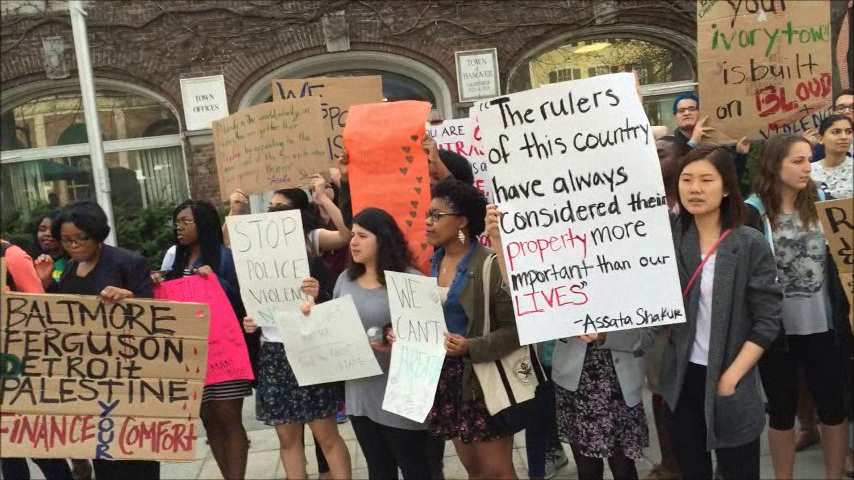
Attention must be paid to the plights of people who claim to have been shafted by the status quo. But no self-described victim is entitled to be believed and catered to without skepticism.
If one took the time to chart out the dates that RealTalk, the Freedom Budgeters, and similar groups have chosen to mobilize over the past three years, the pattern would amount to a kind of “protest cycle.” Like the tides, the College’s many “resistance movements” seem to wax and wane with the seasons, with spring marking the recurring high point.
It’s not hard to see how warm weather and a critical mass of students on campus can cause passion to bubble through the student body. But while most of us channel that energy into good-natured if not always wholesome pursuits, a small group of students always converges to play the opposition to Dartmouth’s optimistic majority.
This year the protest fever was notably accelerated by the national context. Students are plugged in to the ongoing Freddie Gray homicide controversy and the resulting protests, and are also carrying the accumulated angst from the deaths of Michael Brown, Eric Garner, and others since last spring term. As The Review recorded in a seventeen-minute video, a larger than normal group of students marched down Main and Wheelock streets on Saturday, May 2, to shout their support for the cause.
A small detachment of the marchers continued to chant outside the yards of Alpha Chi and KDE as they held their respective Pigstick and Derby parties, turning their attention from police persecution to what they perceive as its campus counterpart: the racial stratification that’s supposedly owed to our discriminatory structure. As usual, the Greek System was their bête noire, but no non-disadvantaged group was safe when they decried the administration and every student who dared not to join in.
How should those in the majority receive these protests, when we may support some of the basics of the cause but not the exaggerated specifics and certainly not the protesters’ tactics? It’s a recurring question for a good reason. It’s easy to say that students with no respect for decorum deserve no respect in turn. But the spirit of collegiality should cut both ways; as wrong as it is for the protesters to withdraw into a self-enclosed faction, we in the majority shouldn’t follow their example by sealing ourselves off to simply listening to their concerns. A healthy college, and especially a small one, requires a kind of unconditional amicability. The protestors’ tone and tactics have never been harsh enough to warrant denying them a fair hearing among friends.
The follow-up question is, “What do we learn from that hearing?” On the topic of Baltimore, the national protest movement has clearly highlighted a lot of concerns worth reckoning with. For each video that emerges exposing blatant police misconduct, it’s reasonable to assume that there are many more instances where misbehaving officers’ accounts were taken at face value and innocent victims were denied justice. The overzealous framing of the reformists’ message and the demagogic catchphrases they love to sprinkle in (“Hands up, don’t shoot!”) have turned a lot of potentially sympathetic observers off to the cause. But Dartmouth students should strive for the intellectual maturity to look past the framing and address the merits and weaknesses of the arguments themselves.
When it comes to the RealTalk crowd’s take on campus issues, our reaction should start the same way but end a little differently. As of yet, there’s no reason to deny them an open ear, but in about three years of trying they haven’t filled our heads with any substance about Greek life or any other issue. Their technique of using legitimate issues as a pivot point into cooked-up student life concerns is pretty deft. The Dimensions protesters used student anger over sexual assault to try to convince that “Dartmouth has a problem” with regard to every issue under the sun, and the most recent agitators have drawn an invisible line to connect Hanover to Baltimore. But unlike the supporters of the sexual ethics and police reform causes, the “white supremacy is alive at Dartmouth” crowd has never offered a bit of evidence to support their claims. So once we’ve heard them out, with all the respect and compassion that befits Dartmouth men and women, our response should be to do absolutely nothing.
To sum it all up, we should admit that Arthur Miller was on to something when he reminded us that “attention must be paid” to the plights of people who claim to have been shafted by the status quo. But no self-described victim is entitled to be believed and catered to without skepticism. There is nothing disrespectful, or “oppressive”, about requiring students to demonstrate why their cause is legitimate, rather than automatically deferring to their “experience.”
Measured by this standard, President Hanlon’s response to the Freedom Budget sit-in was pretty skillful. He walked the line between respect and deference by letting them have their fun for a good few days but then doing basically nothing to address their demands. Until the day the United Discontents of Dartmouth can be bothered to defend their claims, we should hope that the administration and student body remain tactful enough to continue having them over for tea and then kindly show them the door after the unsavory exchange is through.

Be the first to comment on "Attention Must Be Paid?"